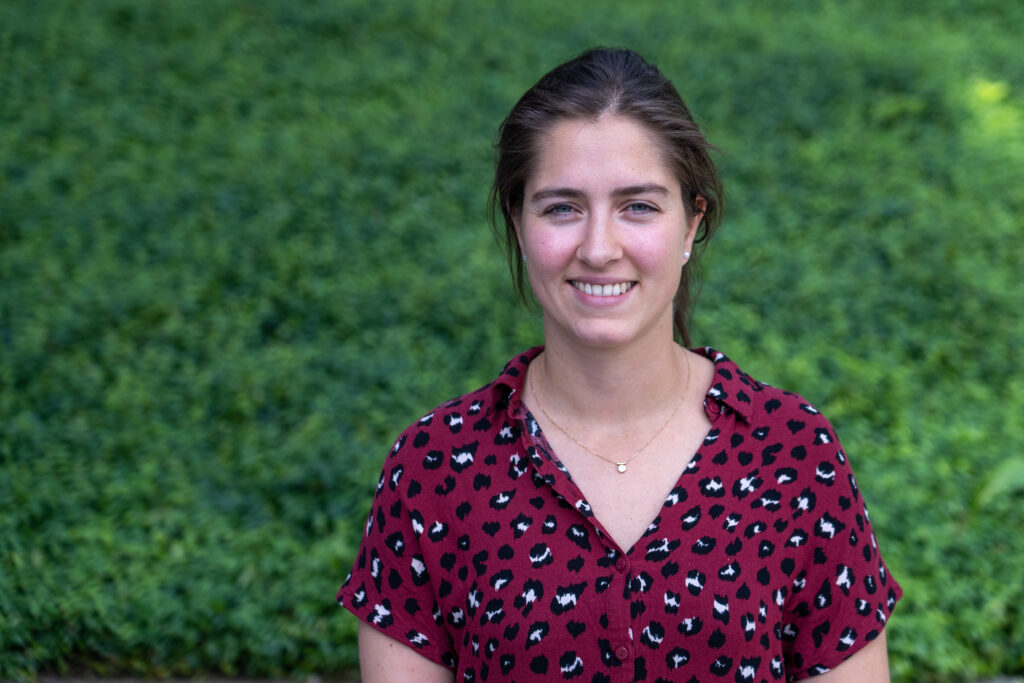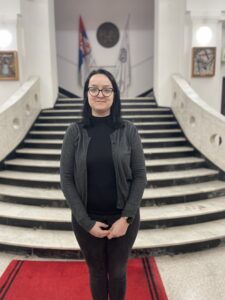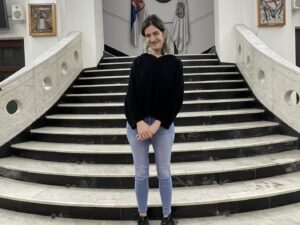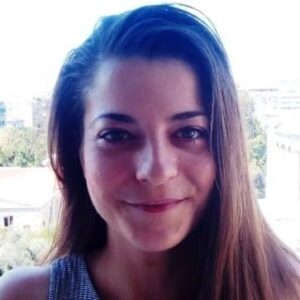Interview at end of the journey with Mathilde de Jongh, Policy advisor, Water Board Delfland, The Netherlands
September 2021
I read about EJWP on social media, and I thought it was interesting with my global focus background. Delfland in the Netherlands is my first professional job, so I was interested in learning more from other organizations in the sector: how they work and what the atmosphere is like. I was also looking forward to learning first-hand from more on-site visits to the other participating organizations, although the Covid pandemic has interrupted this.
We’ve had three live Training Week visits: one here at my own organization, one at Isle Utilities in Italy and also at Water Europe in Brussels. The other places have been virtual visits, and I’ll say that the personal interaction is missed. It feels good however that I’ve experienced the work culture of another type of organization in Italy, and at Water Europe. It’s valuable that we meet with other young professionals with different backgrounds, to exchange and learn from experiences.
Originally from the Netherlands, I have a bachelor’s in civil engineering and a master’s in international land and water management, with an interest in the social and governmental aspects of our natural resources. I’m currently working as a policy advisor at the regional water authority Delfland, focused on the transition in the water chain and stakeholder management
Together with drinking water companies and municipalities, we work with the mutual gains approach to make the water chain more efficient, from tap to the sewer, and on to the wastewater treatment plant. Understanding each other’s interests in this process is important to work efficiently in the water chain, and to close the water loop. I am part of the programme “transition of the water chain,” working towards sustainable loops of water, energy and recourses for Delfland. Right now, treated wastewater from this region is going into the North Sea, and then it’s gone. We prefer to use wastewater for future purposes, like as a freshwater source.
Personal development has taken place during EJWP trainings and also from the trainer, Jennifer’s, coaching sessions. I was struggling in some aspects of my work, so I had a conversation with Jennifer. This helped me better see what kind of job I feel good in – as well as what kind of tasks. It was learning more about who I am within my own position – and dealing successfully with complex issues. I’m enjoying my work a lot now, and I think this all helped. These coaching sessions have been the most valuable part of EJWP for me, so there could be even more in the programme on personal development. Sometimes the activities and plans are changing, so clarified plans are always more helpful, seeing that pop-up activities can be hard to manage within the time.
The EJWP project on creating impact by who you are made an impression on me, and was valuable to in creating a personal development plan. This is connected with the personal training. Conversations with the trainers helped me get it on paper. And getting it on paper helps get it into practice.
In an ideal water-sector world, everybody would be more aware of the value of water resources and feel more responsible for their responsibilities: politicians, scientists, citizens etc. Less pollution and more efficient use of water would be the results. In the current governance aspect, water tasks are separated in different organizations, and this leads sometimes to difficulties in implementing policy. Everybody should be working more closely together, also on international, national and regional scales. This would lead to learning more from each other on an international scale, as well as to better adapted European and national policies.
I have the feeling that in my job I can contribute to a sustainable environment and the protection of health for a specific region. In the future, I would like to do this as well for other regions of the world. And more in the present, we need to take care of our water and see it as a valuable resource. Communication is key in making others understand the different experiences to help meet water challenges in the future.
Introduction at start of the journey with Mathilde de Jongh, Policy advisor, Water Board Delfland, The Netherlands
June 2019
I did a bachelor in Civil Engineering and a Master in International Land and Water management. During my study I got fascinated by the value of wastewater. As a result, I’m currently working as a policy advisor wastewater at the regional water authority Delfland in the Netherlands. This job enables me to work with the complex (waste)water management issues in this urban region in the Netherlands. In addition, I am eager to further develop myself and really interested in intercultural communication. Besides, I would like to learn more about the political, environmental and social aspects of complex water management issues.
I started the European Junior Water Programme because it enables me to work across borders to learn more about solving water management issues in other parts of Europe. It gives me the chance to collaborate with other young water professionals in water challenges and to exchange knowledge and experiences with them. Besides, I can work further on my personal development. As participant in the European Junior Water Programme, I get the opportunity to improve my skills in working on a sustainable and safe water management system together.






